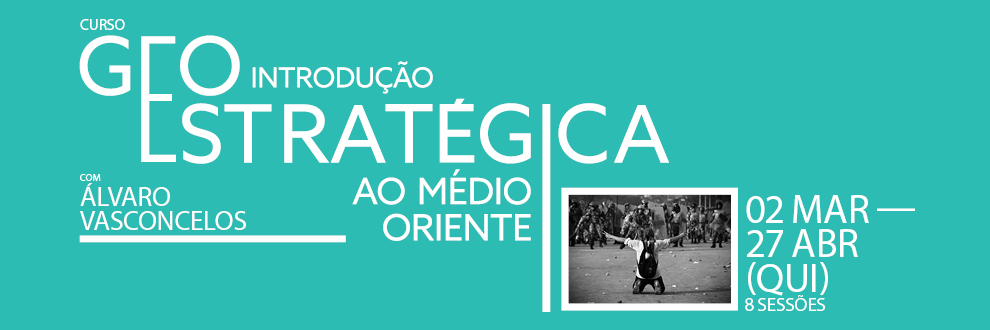COURSE – A GEOSTRATEGIC INTRODUCTION TO THE MIDDLE EAST
The countries of the Mashreq and the Maghreb, that broadly encompass the Middle East region, have dominated international news for many years. At present the main areas of interest are the wars in Syria and Iraq, the refugee crisis, and the emergence of radical Islamic movements. But extensive news coverage of a given event doesn’t necessarily generate thorough knowledge of the issues at stake, given that few world regions have been subject to so much contradictory information. What are the reasons for the war in Syria? Why can’t Israel and Palestine live in peace? What are the political Islamist movements? How was Daesh born and what interests does it represent? Why have democratic revolutions failed in the Arab world? What are the reasons for democratic success in Tunisia? What is Portugal's relationship with the Maghreb region?
The Serralves Foundation aims to contribute to the knowledge and study of the geostrategic situation of its neighbouring region - Morocco is located 140 km from Portugal’s south coast. The French philosopher Edgar Morin has classified it as "the powder keg of the world", but it is also a region rich in opportunities and potential changes.
Coordination: Álvaro Vasconcelos, associate senior researcher of the Arab Reform Initiative, former director of the Institute for Security Studies of the European Union.
Organization: the Serralves Foundation, in collaboration with the Arab Reform Initiative (ARI) and CEIS 20 of the University of Coimbra.
Target audience: This course is aimed at teachers, students, journalists and business people, as well as anyone interested in furthering their knowledge of the major political, economic and security trends in the southern Mediterranean region that can mould its future.
Methodology
The course will be taught in eight 2-hour sessions: five theoretical sessions and three sessions dedicated to case studies, in which the auditors will work in groups and conclude with a report on one of the four topics under study. A public debate will be held in the closing session.
Bibliography
The course organisers will provide a bibliography for each topic to the auditors and will enable participants to become familiar with experts and leading international policy research centres that study the Middle East.
Diploma
A course participation diploma will be issued to anyone who attends at least 6 sessions.
Study trip to Tunisia
For anyone interested, a study trip to Tunisia will be organised after the course. Registration details and information about the trip’s cost and conditions will be provided during the course. Only course participants will be able to register for the trip.
The session on Portugal will be provided by the historian Cláudio Torres.
The speakers, who will participate via Skype, include the following:
- George Joffé, Cambridge University
- Abdallah Saaf, Director of the CERSS of Ra-bat
- Georges Fahmi, Egyptian specialist at the European University Institute, Florence
- Azzam Mahjoub economist at the University of Tunis
- Salam Kawakibi, Syrian expert, deputy director of the Arab Reform Initiative. 1st strategic analysis: the Middle East: ancient and future conflicts
- The Middle East in a polycentric world;
- The democratic revolutions and the new fracture lines in the Middle East;
- The struggle for regional hegemony between Saudi Arabia and Iran;
- Strategic fragmentation and sectarian conflicts: Syria, Iraq, Libya and Egypt;
- Non-state actors: origins, development and ideology of Daesh;
- Israel and the Palestinian question: is this the key strategic issue?
2nd strategic analysis: The Maghreb:
- Democratic transition and political reforms
- Democratic hopes: Tunisia and Morocco;
- Political Islamist movements and overcoming authoritarianism;
- Patriarchal society: women's rights and religion;
- The dangers deriving from Libya and the Sahel;
- Does Algeria guarantee regional security?
- What role can be played by outside actors?
3. The European Union and its southern neighbours: the Islamic question
- The European Union as a regional actor: the Middle East and the Maghreb;
- Europe confronted by the Arab revolutions;
- Europe’s neighbouring policy;
- The doctrine of the clash of civilisations and banalisation of Islamophobia;
- The populism of the extreme right, radical Islam and the rebirth of nationalist identity.
4. Portugal and the Mediterranean
- Portugal a country that has a "Mediterranean character and an Atlantic position";
- Arab presence in the Iberian Peninsula;
- Arab cultural heritage in Portugal: language, culture and religion;
- Portugal viewed by the Arabs, perceptions and heritage;
- Arab studies in Portugal;
- Portugal's diplomatic relations with southern Mediterranean countries;
- Portuguese foreign policy and the dynamics of Euro-Mediterranean relations.
Topics to be studied:
- The Syrian regional conflict, with Salam Kawakibi, ARI [via skype];
- Israel and the Palestinian question, with guest speakers [via skype];
- The role of Portuguese actors in consolidation of political reforms in Tunisia and Morocco, with Azzam Mahjoub, Professor, University of Tunis and Abdallah Saaf, Director of CERSS, Rabat [via skype];
- The European Union and the refugee issue, with George Joffé, Cambridge University [via skype].
Closing session (public session): Portugal in the Future of the Middle East and Maghreb.
Maximum number of participants: 60 persons.
Registration: 120 €
Friends of Serralves: 100 €
Students: 60 €
To register, please contact Manuela Ferreira via the e-mail address m.ferreira@serralves.pt.
Scholarships: The Eng. António de Almeida Foundation will award 30 scholarships for the Strategic Introduction to the Middle East course. The scholarships are available to students of PhD programmes, Master’s programmes or final year students of bachelor degree courses. The application must be sent to the electronic address: cursogeostrategia@gmail.com, until January 30, 2017, accompanied by a CV and letter of motivation. Applications will be reviewed by a jury, chaired by the course coordinator.

